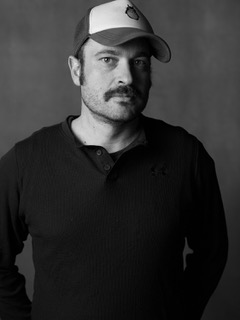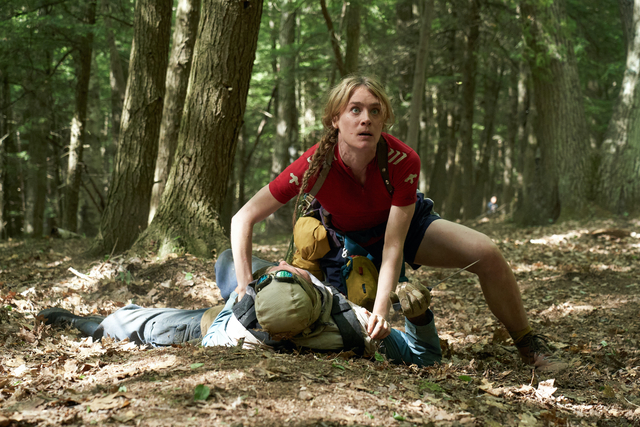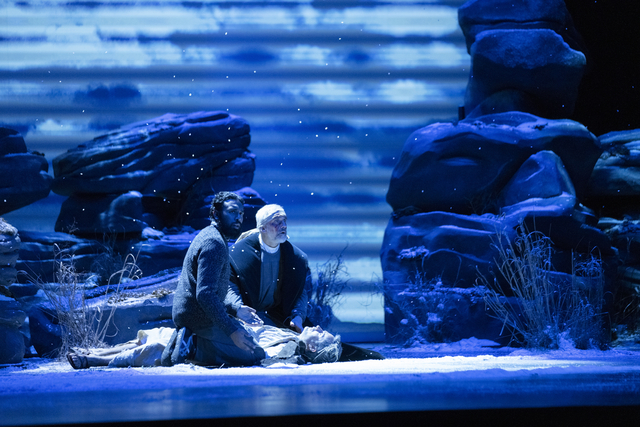Based on the novel of the same name by Emily St. John Mandel, Patrick Somerville (Maniac, The Leftovers) developed a television version of Station Eleven, a post-apocalyptic flu pandemic tale with criss-crossing timelines from the world the characters live in, the world they left behind, and the world they aspire to build.
“We had to tell a story that was palatable,” said Somerville, given that Station Eleven was filmed both before and during the COVID-19 pandemic. He wanted to make a TV show surrounding a large global event, but didn’t want to focus on the pain and misery that arose from the resulting widespread death. “We focused more on the rebuilding and the recovery time.” This was facilitated by the twenty year forward time jump in the story featuring the Travelling Symphony. The cast and crew were inexorably affected by the pandemic during filming, so certain elements of finding joy in fear, anxiety, and panic subtly infused themselves into the TV series.
“The later episodes of Station Eleven reflect a certain gratitude for the things we have,” postured Somerville. The post-apocalyptic scenario has been explored many times in novels, films, and TV shows, but somehow, Station Eleven is different. “There was something intriguing about the way author Emily St. John Mandel intermingled the Hollywood storyline with the flu pandemic that got me interested.”
Patrick was also captivated by the airport scenes and the notion of using old technology that wasn’t previously appreciated in order to survive. He was enticed by a large scale story that stayed small and intimate in its telling.

Patrick Somerville
Patrick Somerville describes Station Eleven as having “a sense of grounded realism with a supernatural wink. There’s also some levity and self-awareness that makes what should have been a sad story, a fun story.”
The Travelling Symphony
The flu pandemic survivors created their world by putting on Shakespearean plays across the world. Somerville has a somewhat more sober view of the value of the arts in society. “The cynic in me believes that art doesn’t affect anything. It’s just art. The romantic in me responds to the idea that the Travelling Symphony isn’t trying to save the world. It’s there for their wellbeing.”
In spite of a lack of lofty goal for their plays, the symphony does make a positive impact on the world. “Art just needs to be genuine to succeed.”
For the over-thinkers that believe that everything must have specific meaning, King Lear featured prominently in Station Eleven. It signalled Arthur Leander’s (Gael García Bernal) ambition to tackle a challenge of Shakespearean proportions. “We also see how reality reshapes itself when a key figure loses his power as his colleagues go out to become the powerful.”
The Prophet/ Tyler Leander (Daniel Zovatto) was abandoned as a child like Kirsten Raymonde (Mackenzie Davis). “The Prophet is unique because he had access to a graphic novel that changed him.” Kirsten was raised on a literary diet of Shakespeare, whereas Tyler was more singular and focused on one novel to maintain his emotional balance. It’s messy with Tyler because he weaponizes his storytelling, whereas Kirsten simply appreciates it. “She does see Tyler’s response to storytelling as morally problematic.”
“Station Eleven tells many stories about people who need to communicate something,” added Somerville. “If you have something inside of you that’s formless and unsaid, it’s hard to say these mysterious things out loud.” The writer expanded that many people have difficulty in communicating. “How do you say what you want to say?”
How do you hear what’s inside of you, let alone say it to others?
Miranda Caroll (Danielle Deadwyler) is a prime example of this. She listens to her inner voice and allows herself to be guided by it. “The other characters are different versions of that. It unifies us.” Station Eleven centers on our need to tell our stories, but also, to listen to others. But we need to give a feeling the time and space to form into words and eventually a story.
Non-linear timelines feature heavily in Station Eleven. “I never actually thought of them as a way to tell the story. I thought of them as THE story,” announced Somerville. Our current life experiences cannot be untangled from our past and future selves. “We wouldn’t make sense of young and older Kirsten’s performances if they weren’t braided together.”
This also serves a higher purpose – to highlight the loss when communicating with a younger version of yourself. “Healing comes from the dialogue you’re having with your own history.”

Kirsten Raymond (Mackenzie Davis) Photo by Ian Watson/ HBO Max
Somerville is attracted to alternative lives the characters might be living, but is mindful of not overwhelming the audience. “Small gestures can sometimes be more powerful than big moves.”
First And Last
The pilot episode is arguably the most important one in the series since to sets up the show and invites the audience to invest in the entire season. “We always had the goal of keeping the pilot episode pretty simple even though the show to come was very complicated.” Episode 1, Wheel Of Fire, was more about setting up the relationships. Famous actor Jeevan Chaudhary (Himesh Patel) tragically collapses on stage during a performance of King Lear. Patrick Somerville’s goal was to bring Kirsten and Jeevan together from being strangers at the start of the episode to caring about each other by the end. “We wanted to meet these two human beings and get them to meet each other. Everything else is unfolding in the background.”
Patrick’s favourite scene in this episode occurs in the parking lot when Jeevan convinces Kirsten to come along with him. “We felt that it had to matter to the audience that they stayed together even if they didn’t fully understand why.”
The final episode is seductively called Unbroken Circle. It suggests a both a completion and a continuation of the story; a pause and a movement. “I didn’t want to do anything final. In the end, Station Eleven is some chapters from some lives.” The concept of a circle relates to a frame around certain people trying to overcome adversity. “Kirsten and Jeevan finding each other again and saying goodbye felt like a completion of their story.”
Patrick Somerville likes the idea of using episodes as story building blocks and an organizational tool. This is evident when each episode is told from a specific character’s point of view. Miranda featured in episode 3, Hurricane, where she reflects on her relationship with Arthur and Dr. Eleven and Clark (David Wilmot) and Elizabeth (Caitlin Fitzgerald) headlining episode 5, The Severn City Airport, allowed Somerville to order the stories in the series. “We didn’t want all the viewpoints coalescing together in each episode.”
Patrick likes surprises in his stories. “I like big stories, small stories, and hugs, especially in complicated world-building. I like to tell warm stories about good people I admire. I’m drawn to human kindness as opposed to cruelty or depravity.”
Music heavily inspired both the writing and execution of Station Eleven. Somerville started working with his composer Dan Romer early in the development process. They wrote several folk songs that the Travelling Symphony could perform before production began. “Dan and I worked together on the score for the version of Hamlet that appeared in the show.”
Patrick described the inherent musical rhythms to the show in the way the stories are told. Music adds to the emotionality of Station Eleven.
